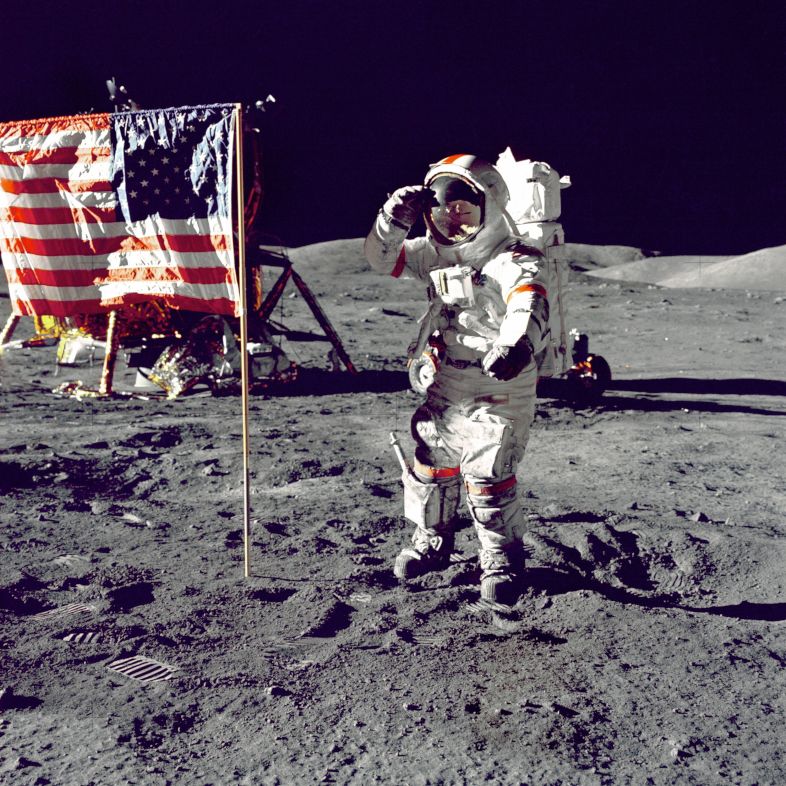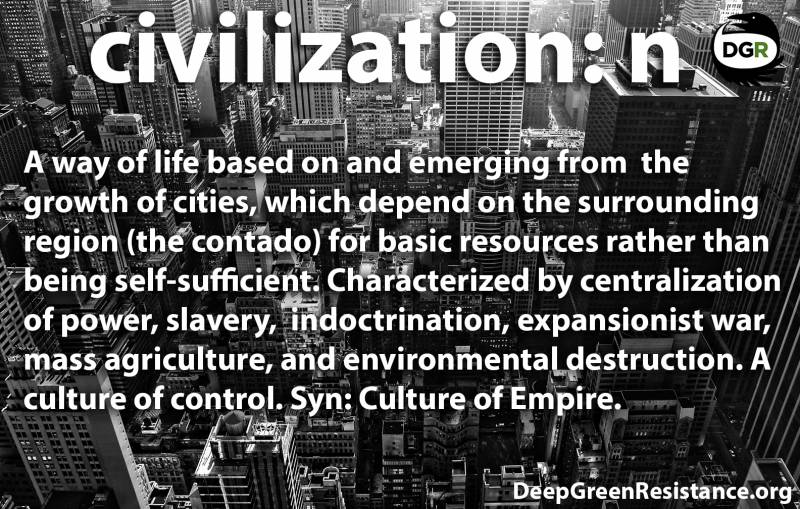By Boris Wu / Deep Green Resistance Germany
Deep Green Resistance stands for the resistance against the culture of empire, aka civilization. For many people this may sound very new, strange and, understandably enough, frightening; most people associate something positive with the term “civilization”. As a person born into this culture it is not easy to question it, and even harder to perceive the culture itself as the major problem. This is where DGR’s analysis comes in.
So, what is civilization?
History begins about 10,000 years ago, when humans stopped grunting in caves, invented agriculture and gradually settled down. Agriculture and sedentariness enabled the construction of ever larger cities, innovations such as the monetary economy led to trade relations and an increasingly complex division of labor. The development of writing systems made it possible to literally write history. From then on, a period of constant development began, with higher and higher, ever more complex forms of technology. Civilization was so successful that it has spread all over the world to this day.
This is just a short attempt to describe the common myth. Another description from writer Fabian Scheidler1:
“The standard version – the myth of Western civilization – tells of a process of tediously achieved progress which, despite all adversities and setbacks, has led to more prosperity, more peace, more knowledge, more culture and more freedom in the end. In this version wars, environmental devastation and genocides are slips, relapses, setbacks or undesirable side effects of a generally beneficial process of increasing civilization.”
Wikipedia provides the following definition:
“A civilization or civilisation is any complex society characterized by urban development, social stratification imposed by a cultural elite, symbolic systems of communication (for example, writing systems), and a perceived separation from and domination over the natural environment.”2
According to Derrick Jensen, civilization is “(…) a culture – that is, a complex of stories, institutions and artifacts – that both leads to and emerges from the growth of cities (…), with cities being defined – so as to distinguish them from camps, villages and so on – as people living more or less permanently in one place in densities high enough to require the routine importation of food and other necessities of life. Thus a Tolowa village five hundred years ago where I live in Tu’nes (…), now called Crescent City, California, would not have been a city, since the Tolowa ate native salmon, clams, deer, huckleberries, and so on, and had no need to bring in food from outside. Thus, under my definition, the Tolowa, because their way of living was not characterized by the growth of city-states, would not have been civilized. On the other hand, the Aztecs were. Their social structure led inevitably to great city-states like Iztapalapa and Tenochtitlán, the latter of which was, when Europeans first encountered it, far larger than any city in Europe, with a population five times that of London or Seville. Shortly before razing Tenochtitlán and slaughtering or enslaving its inhabitants, the explorer and conquistador Hernando Cortés remarked that it was easily the most beautiful city on earth.”3
Deep Green Resistance uses Derrick Jensen’s definition of civilization. Civilizations are by definition not sustainable and never can be. Yet there are two possible ways for civilizations to end: Either they are consumed by a even larger and/or more powerful civilization, a process which is usually accomplished by the use of brutal violence and leads to deep, intergenerational trauma (as we’ve seen with the example of the Aztecs), or they collapse because they used up their resources and cannot expand any more for some reason (as we’ve seen with historical civilizations, and we experience nowadays with our own industrial civilization, which is on the edge of abyss because it is killing the planet).
This is why we advocate for a culture of resistance and the building of alternatives.
Civilization usually looks good only from the perspective of the civilized; Samuel Huntington puts it very aptly: “The West won the world not by the superiority of its ideas or values or religion […] but rather by its superiority in applying organized violence. Westerners often forget this fact; non-Westerners never do.”4
We, as members of Western civilization, should listen very carefully and respectfully to the voices of others, in particular indigenous peoples, since they have been and and still are being hit hardest by the violence of our culture. The Osage chief Big Soldier said:
“I see and admire your manner of living. . . . In short you can do almost what you choose. You whites possess the power of subduing almost every animal to your use. You are surrounded by slaves. Every thing about you is in chains and you are slaves yourselves. I fear that if I should exchange my pursuits for yours, I too should become a slave.”5
Apart from indigenous peoples, it is sometimes ethnologists who are able to see our culture from an outside perspective:
“On his expeditions, Lévi-Strauss came across a tribal culture that seemed irritable and highly dangerous to him. It plundered nature, devastated entire regions, worshipped arty idols, massacred its own kind and was notorious for its historical carnages. In the meantime, this exotic tribal culture has defeated all competitors and rules the world. Its name is ‘civilization’.”6
Let me end with the words of Bengali poet Rabindranath Tagore:
“The civilization of ancient Greece was nurtured within city walls. In fact, all the modern civilizations have their cradles of brick and mortar. These walls leave their mark deep in the minds of men. They set up a principle of ‘divide and rule’ in our mental outlook, which begets in us a habit of securing all our conquests by fortifying them and separating them from one another. We divide nation and nation, knowledge and knowledge, man and nature. It breeds in us a strong suspicion of whatever is beyond the barriers we have built, and everything has to fight hard for its entrance into our recognition.”7
“Civilization, civilization, pride of Europeans… Whatever you strive for, whatever you do, you always move within a lie. When you see it, the tears flow, the pain screams. You are the violence before the law. You are not a torch, you are a conflagration. Everything you touch, you consume.”
“European civilization... is a cannibal civilization; it oppresses the weak and enriches itself at its expense. It lets envy and hatred shoot up everywhere, wherever it goes, no grass can grow anymore… Its power comes from directing all its forces towards the sole aim of enrichment… Under the codename patriotism, it breaks the given word, shamelessly throws out its nets woven from lies, erects monstrous giant images in its temple dedicated to profit, in honor of the God it worships.
Without the slightest hesitation we prophesy: this will not last forever!”8
1Fabian Scheidler (2015): Das Ende der Megamaschine, p.10 (translated from German)
2https://en.wikipedia.org/wiki/Civilization
3Derrick Jensen (2006): Endgame Vol. 1 „The Problem of Civilization“, s. 17f
4Samuel P. Huntington (1998): The Clash of Civilizations and the Remaking of World Order
5https://unsettlingamerica.wordpress.com/2012/02/12/derrick-jensen-civilization-decolonization/
6Nachruf aus der „Zeit“: http://www.zeit.de/2008/48/Levi-Strauss-100/ (translated from German)
Claude Levi-Strauss (1978): Traurige Tropen, Surkamp
7https://www.goodreads.com/quotes/8096921-the-civilization-of-ancient-greece-was-nurtured-within-city-walls
8https://www.aphorismen.de/zitat/185371 (emphasis added)



For a fun read (available free online), try Rudyard Kipling’s 110-year-old short story, “As Easy As ABC.”
Kipling envisioned a libertarian anti-civilization, where society had voluntarily rebelled against its own growth and complexity. Chicago had depopulated to a census of 6,000, where the only crimes were crowd-making and invasion of privacy.
The story concludes with a poem called “McDonough’s Song,” the last verse of which I memorized, the first time I read it:
“Once there was The People
Terror gave it birth
Once there was The People
And it made a hell of Earth
Earth arose and crushed it
Listen oh ye slain:
Once there was The People
It shall never be again.”
I hold my head in my hands when a piece opens with factual inaccuracies caused either by ignorance, stupidity or laziness.
The author thus loses all credibility thereafter, no matter how ‘sound’ the remainder of the piece may be.
To open with – “ History begins about 10,000 years ago, when humans stopped grunting in caves, invented agriculture and gradually settled down“, indicates one or more of the above noted factors at play. Pre-neolithic societies were often culturally highly-sophisticated, agriculture was a slow development, and not an ‘invention’, and no-one had been ‘grunting’ for innumerable millennia prior to that.
Dreadful.
Graeme, we recommend reading the rest of the piece. That intro was intentionally and ironically meant to convey one inaccurate but common perspective, as the piece says later on.
Well, I did read the entire article of course, perhaps I missed the clarification later on. I’ll re-read, and offer apologies in advance if indeed I’m in error.
Regards. G.